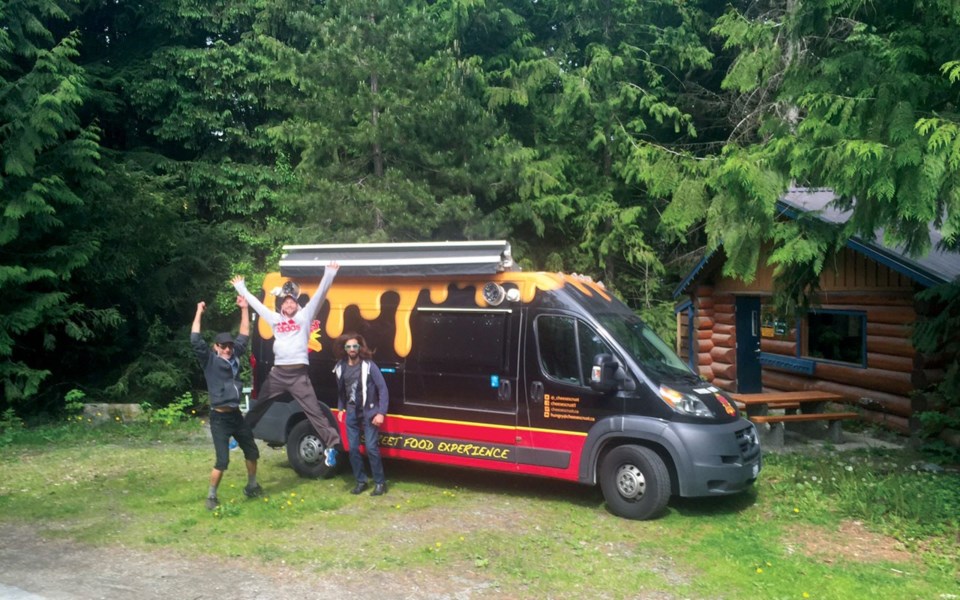When I first learned, back in 2016, that Whistler would be launching a food-truck program of its own, I let out a small but audible gasp. That reaction was partly out of sheer excitement and partly out of shock that the Resort Municipality of Whistler (RMOW) had finally pulled the trigger on a trend that was already dominating the street-food scene of myriad other cities around the country.
It's now been three years since that announcement (four since a pilot food-truck project the muni ran in the summer of 2015), and the program has seen little in the way of growth. According to a spokesperson for the RMOW, that is not likely to change anytime soon.
"There have (been) no discussions about expanding the program at this point in time," the representative wrote in an email.
Almost every one of the vendors coming to Whistler's parks this summer that I spoke to for a story in Pique last month ("Seven vendors slated for Whistler's summer food-truck program," April 19) expressed some degree of hope that the RMOW would loosen up the program's restrictive regulations.
"I think there's room for improvement in the program," said Karin Shard of Squamish-based Greek food truck Carte Diem, who added that she has reduced the number of days she will be in Whistler this summer. "I find that it is a risk for most people participating in the program, (especially if) they are commuting."
Of particular issue for Shard and other vendors is the weather: The RMOW will typically cancel planned vendor days if the morning forecast calls for rain, but if it's overcast or rain arrives later in the day, sales suffer. Factor in travel and operating costs—Shard estimates it costs her around $1,000 a day just to set up shop in Whistler—plus the $75-a-day fee vendors have to fork over to the muni, and the cost-benefit analysis doesn't always pan out.
Shard, for her part, has suggested that the RMOW either lower the cost to participate or institute some sort of profit-sharing structure on bad-weather days. "But we're not there yet," she noted, adding that she is grateful for the opportunity to be in the Whistler market nonetheless.
Of course, the program's other major barrier is location. Relegated to Rainbow and Lost Lake parks—with Lakeside Park serving as an alternate site when necessary—the program runs on select days over a span of roughly two months.
Unsurprisingly, the majority of participating vendors would like the opportunity to sell their product closer to the village and its constant flow of pedestrian traffic—something that, according to the prevailing word on the street, has long been opposed by Whistler's bar and restaurant sector.
We all know that old adage about competition breeding success, and in a casual food scene that is still ruled by greasy, overpriced pub fare, I don't think I'm being overly harsh when I say there are plenty of Whistler restaurants that could use a little kick in the butt.
Not to mention, food trucks would offer the styles of cuisine that don't already exist here—how are we still without a dedicated Chinese restaurant?—at an affordable price that our overworked, underpaid worker bees would certainly appreciate.
And it's not like the program would have to run on a daily basis. Allow food trucks to set up at large-scale events—lord knows we have enough of those dotting the schedule—and you have added yet another layer of animation as well as a wider variety of dining options during times when it's near-impossible to find a seat in a restaurant.
"There's definitely enough to go around," said Clare Stenham-Brown, owner-operator of the plant-based Turmeric Trailer, who spoke about the burgeoning food-truck scene in Squamish. "We're finding that it's more encouraged because (the District) just wants the buzz, the people coming in and having lots of options. It doesn't need to be a sit-down, tip-in kind of environment."
This is all before you consider the potential economic windfall food trucks could bring. In a 2017 report, the Canadian Competition Bureau said that more flexible regulations around food trucks could lead to more jobs, new customers, and improved street vitality in an industry that brings in more than $300 million a year in sales. The industry continues to expand at a healthy clip, too: the Canadian food-truck sector has averaged 2.3-per-cent growth annually since 2013.
In Vancouver, for instance, the number of food trucks has skyrocketed from just 17 in 2010 to now more than 100 after the City relaxed its regulations, furthering Vancouver's reputation as a global food destination.
Food trucks have also proven to be an essential stepping-stone for young chefs and restaurateurs who would otherwise not be able to afford commercial space. In a town where locally owned retailers are being priced out at an alarming rate, loosening the muni's regulatory grip on food trucks would not only create a lower-cost entry point into the restaurant business, but would also help preserve a distinct mom-and-pop character that we are told time and again consumers are looking for.
It's clear the appetite for food trucks is there; it's up the municipality to decide whether to satiate it or not.




